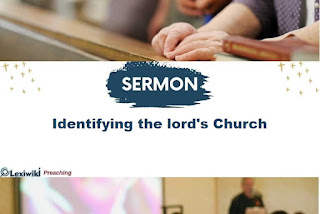Identifying the lord's Church
Early church history is important to understand because it set the foundation for Christianity. During this time, the early church focused on preaching the message of Christ's resurrection, founded seminaries, and educated people about their faith. The early church also experienced rapid growth due to its focus on spreading the gospel and its focus on education.
- the “ the body” of Christ Ephesians 1:22-23
- the “fullness of” God Ephesians 1:22-23
- “one body” Ephesians 4:4
- made up of “ citizens” and so is a kingdom Ephesians 2:19
- “purchased” with blood Acts 20:28
-- Ads --
I. The early Church Preached the Word of God with Boldness (Acts 4:31)
The early Church stood firm in proclaiming the word of God with boldness. In Acts 4:31, we witness their unwavering courage to speak the truth despite challenges. This trait defines the Lord's Church—an unapologetic commitment to sharing the Gospel message that transforms lives and hearts.
Ephesians 4:12-13 The Mission of the Church. What the mission of the church is: To serve, protect, and defend God’s Word.
The Mission of the Church
- Serve Romans 7:4; Eph. 4:12, 15-16; Rom. 12:3-8
- Protect I Tim. 1:3; 3:15; 6:21; II Tim. 3:14
- Defend Phil. 1:7, 15-16; 2:15; I Peter 3:15-16
II. The early Church Witnessed with Great Power (Acts 4:33)
The Lord's Church is marked by its undeniable impact. Acts 4:33 testifies to the great power with which the early Church bore witness to Christ's resurrection. Their lives reflected the transformative power of the Gospel, drawing others to faith through their testimony.
III. The early Church Witnessed with Great Grace (Acts 4:33)
Alongside their power, the early believers also exhibited great grace. Acts 4:33 highlights the grace-filled manner in which they lived and shared their faith. The Lord's Church extends grace to those within and outside its walls, mirroring Christ's own grace toward us.
IV. The early Church Shared Their Wealth (Acts 4:34-37)
Generosity was a defining characteristic of the early Church. Acts 4:34-37 narrates how they willingly shared their possessions and resources to meet each other's needs. The Lord's Church is distinguished by its sacrificial giving and care for the less fortunate.
-- Ads --
V. Worshiping in Unity (Acts 2:42-47)
Unity in worship was integral to the early Church. Acts 2:42-47 illustrates their devotion to teaching, fellowship, breaking of bread, and prayer. The Lord's Church gathers in unity, seeking to glorify God, strengthen one another, and share in communion.
VI. The Early Church and Persecution (Acts 8:1-4)
The early Church faced intense persecution. Acts 8:1-4 recounts how the believers were scattered due to persecution, but instead of being silenced, they continued to preach the Gospel with boldness. This serves as a reminder that the Lord's Church is not exempt from challenges but is called to shine brighter amidst adversity.
VII. Glorifying in Tribulations (Romans 5:3)
Romans 5:3 teaches us a profound truth—the early Church gloried in tribulations. Instead of being defeated by their trials, they found reason to rejoice in the midst of suffering. This attitude reflects a depth of faith that defines the Lord's Church—a faith that remains unshaken even in the face of hardships.
VIII. Love and Prayer for Tormentors (Acts 7:54-60)
A distinctive trait of the early Church was their ability to love and pray for those who persecuted them. Acts 7:54-60 showcases Stephen's response as he forgave his tormentors while being stoned to death. This radical love and forgiveness underscore the transformative power of Christ's presence in the Lord's Church.
IX. Rejoicing to Suffer Shame for His Name (Acts 5:41)
Acts 5:41 reveals the early Church's response to shame and suffering for the sake of Christ's name. Instead of despairing, they rejoiced. This attitude challenges us to reconsider our perspective on suffering and persecution. The Lord's Church finds joy in sharing in Christ's sufferings, knowing that it draws them closer to Him.
Church Jesus Built Has A Distinctive Message
- The Gospel – 1 Tim. 3:15; Jn. 8:32; 12:48
- Message Never Changes – 1 Pet. 1:22-23
- Strange To World – Acts 17:19-20
- Strange When Practiced – 1 Pet. 4:3-4
- Not Well-Received By All – Jn. 15:18-21
- Not Appeal To All – 1 John 4:5-6
- Faithful Preachers Will Still Proclaim It – 2 Tim. 4:1-2
Read mores
- Seek God: ewarder of those who diligently seek Him” (Hebrews 11:6)
- Debts: Sell the olive oil and pay your debts
- The Love Of Money: Don’t Count On It
- +100 Top Easy Sermons to Preach

